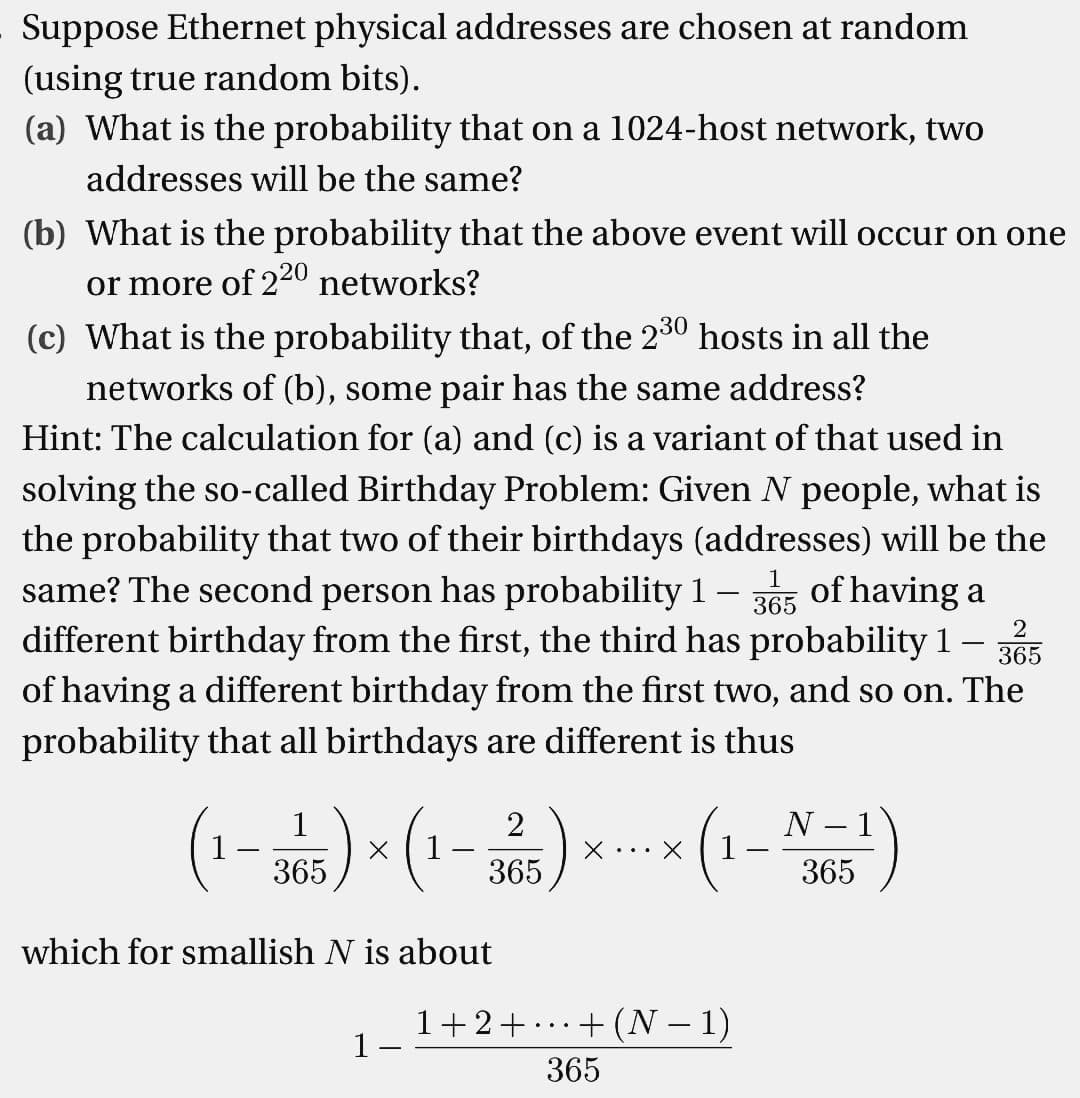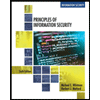Suppose Ethernet physical addresses are chosen at random (using true random bits). (a) What is the probability that on a 1024-host network, two addresses will be the same? (b) What is the probability that the above event will occur on one or more of 220 networks? (c) What is the probability that, of the 230 hosts in all the networks of (b), some pair has the same address? 1 Hint: The calculation for (a) and (c) is a variant of that used in solving the so-called Birthday Problem: Given N people, what is the probability that two of their birthdays (addresses) will be the same? The second person has probability 1 - 35 of having a different birthday from the first, the third has probability 1 - 365 of having a different birthday from the first two, and so on. The probability that all birthdays are different is thus 2 2 N (1-365) × (1-385) ××(1-¹) 365 which for smallish N is about 1 - 1+2+...+(N − 1) 365
Suppose Ethernet physical addresses are chosen at random (using true random bits). (a) What is the probability that on a 1024-host network, two addresses will be the same? (b) What is the probability that the above event will occur on one or more of 220 networks? (c) What is the probability that, of the 230 hosts in all the networks of (b), some pair has the same address? 1 Hint: The calculation for (a) and (c) is a variant of that used in solving the so-called Birthday Problem: Given N people, what is the probability that two of their birthdays (addresses) will be the same? The second person has probability 1 - 35 of having a different birthday from the first, the third has probability 1 - 365 of having a different birthday from the first two, and so on. The probability that all birthdays are different is thus 2 2 N (1-365) × (1-385) ××(1-¹) 365 which for smallish N is about 1 - 1+2+...+(N − 1) 365
Operations Research : Applications and Algorithms
4th Edition
ISBN:9780534380588
Author:Wayne L. Winston
Publisher:Wayne L. Winston
Chapter20: Queuing Theory
Section20.4: The M/m/1/gd/∞/∞ Queuing System And The Queuing Formula L = Λw
Problem 7P
Related questions
Question

Transcribed Image Text:Suppose Ethernet physical addresses are chosen at random
(using true random bits).
(a) What is the probability that on a 1024-host network, two
addresses will be the same?
(b) What is the probability that the above event will occur on one
or more of 220 networks?
(c) What is the probability that, of the 230 hosts in all the
networks of (b), some pair has the same address?
Hint: The calculation for (a) and (c) is a variant of that used in
solving the so-called Birthday Problem: Given N people, what is
the probability that two of their birthdays (addresses) will be the
same? The second person has probability 1-3 of having a
365
different birthday from the first, the third has probability 1 365
of having a different birthday from the first two, and so on. The
probability that all birthdays are different is thus
2
(1-365)×(1-325) × × (1-N5¹)
X X
365
which for smallish N is about
1+2+
1
· + (N − 1)
365
...
Expert Solution
This question has been solved!
Explore an expertly crafted, step-by-step solution for a thorough understanding of key concepts.
This is a popular solution!
Trending now
This is a popular solution!
Step by step
Solved in 2 steps with 1 images

Knowledge Booster
Learn more about
Need a deep-dive on the concept behind this application? Look no further. Learn more about this topic, computer-science and related others by exploring similar questions and additional content below.Recommended textbooks for you

Operations Research : Applications and Algorithms
Computer Science
ISBN:
9780534380588
Author:
Wayne L. Winston
Publisher:
Brooks Cole

Principles of Information Security (MindTap Cours…
Computer Science
ISBN:
9781337102063
Author:
Michael E. Whitman, Herbert J. Mattord
Publisher:
Cengage Learning

Systems Architecture
Computer Science
ISBN:
9781305080195
Author:
Stephen D. Burd
Publisher:
Cengage Learning

Operations Research : Applications and Algorithms
Computer Science
ISBN:
9780534380588
Author:
Wayne L. Winston
Publisher:
Brooks Cole

Principles of Information Security (MindTap Cours…
Computer Science
ISBN:
9781337102063
Author:
Michael E. Whitman, Herbert J. Mattord
Publisher:
Cengage Learning

Systems Architecture
Computer Science
ISBN:
9781305080195
Author:
Stephen D. Burd
Publisher:
Cengage Learning